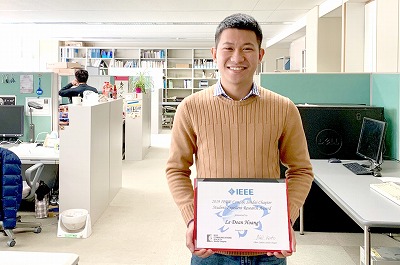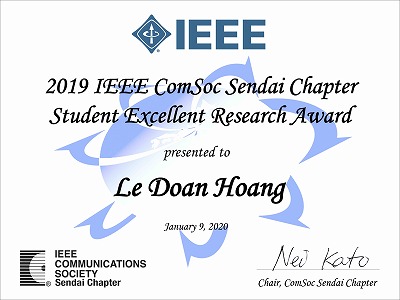Hoang D. Le, PhD student supervised and recommended by Professor Anh T. Pham (※1)of the Computer Communications Laboratory (CCL) (※2), wins the IEEE ComSoc Sendai Chapter Student Excellent Research Award 2019(※3)(※4). The award is targeted to students in Tohoku region with excellent achievements in research areas covered the IEEE Communications Society(ComSoc)(※5). Every year, a maximum of three students are selected for this distinguished award.


Founded in 1952 with the formation of IRE's (the Institute of Radio Engineers) Professional Group on Communications Systems (PGCS), IEEE ComSoc has evolved into a diverse group of global industry professionals with a common interest in advancing all communications technologies. Since the Communications Society began operations in January 1972 as an independent Society of The Institute of Electrical and Electronics Engineers (IEEE)(※6)with over 8,800 members, ComSoc has become the premier international forum for the exchange of ideas on communications technologies and information networking.
Hoang is currently working toward a Ph.D. degree at the CCL, funded by the UoA's research and Teaching Assistant System.
His research focuses on the area of free space optics with an emphasis on error-control protocol design in the R&D of the FSO-based satellite systems for disaster control and management.
During his Master's and PhD programs, Hoang has won a number of awards and grants, including the Best Paper Award at the 9th ICTC in 2018 (※7), the travel grant by the Telecommunications Advancement Foundation (TAF) (※8), Japan in 2019, and the IEEE VTS Tokyo Chapter 2019's Young Researcher Encouragement Award(※9).
Comment from Hoang D. Le: "It is my great honor to be one of receipts of the IEEE ComSoc Sendai Chapter Student Excellent Researcher award for my research achievements in 2019. This award highly motivates and encourages me to continue doing research as well as make more contributions in IEEE society in the future. On this occasion, I would like to express my deep gratitude to my supervisor, Prof. PHAM Tuan Anh for his great guidance and constant support. In addition, my sincerely thanks also go to the University of Aizu for the research support grants during my PhD study, so that I could focus on my research and have the opportunity to obtain this accomplishment"
- ※1 Professor PHAM Tuan Anh
- ※2 Computer Communications Laboratory
- ※3 IEEE Sendai Section
- ※4 Sendai Chapter Award Registration application form
- ※5 IEEE Communications Society (ComSoc)
- ※6 IEEE
- ※7 Computer Communications Lab won the Best Paper Award at 9th ICTC 2018
- ※8 Telecommunications Advancement Foundation
- ※9 UoA PhD student wins the IEEE VTS Tokyo Chapter 2019's Young Researcher Encouragement Award


